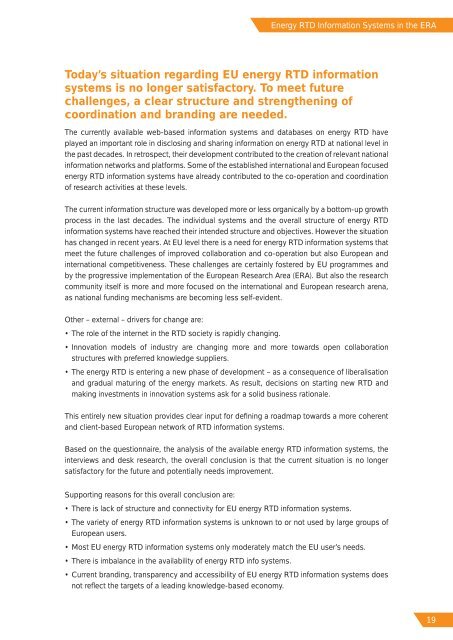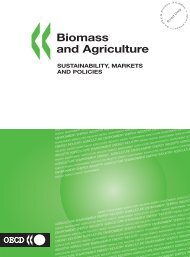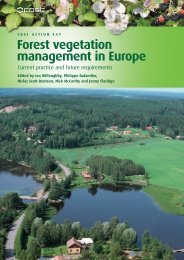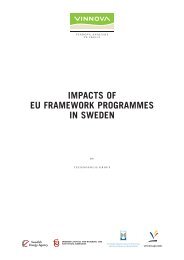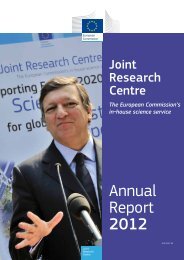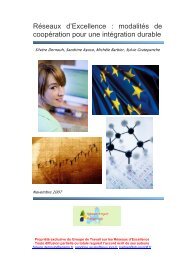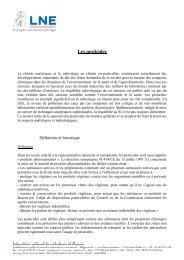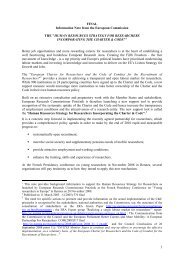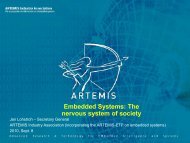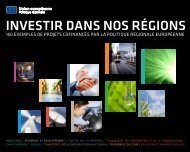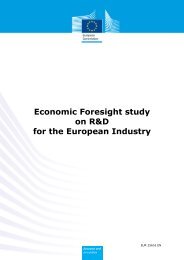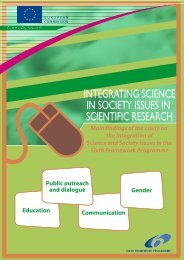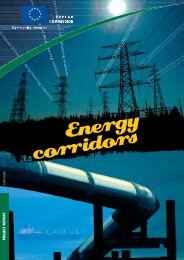Energy RTD Information Systems in the ERA - European ...
Energy RTD Information Systems in the ERA - European ...
Energy RTD Information Systems in the ERA - European ...
Create successful ePaper yourself
Turn your PDF publications into a flip-book with our unique Google optimized e-Paper software.
<strong>Energy</strong> <strong>RTD</strong> <strong>Information</strong> <strong>Systems</strong> <strong>in</strong> <strong>the</strong> <strong>ERA</strong><br />
Today’s situation regard<strong>in</strong>g EU energy <strong>RTD</strong> <strong>in</strong>formation<br />
systems is no longer satisfactory. To meet future<br />
challenges, a clear structure and streng<strong>the</strong>n<strong>in</strong>g of<br />
coord<strong>in</strong>ation and brand<strong>in</strong>g are needed.<br />
The currently available web-based <strong>in</strong>formation systems and databases on energy <strong>RTD</strong> have<br />
played an important role <strong>in</strong> disclos<strong>in</strong>g and shar<strong>in</strong>g <strong>in</strong>formation on energy <strong>RTD</strong> at national level <strong>in</strong><br />
<strong>the</strong> past decades. In retrospect, <strong>the</strong>ir development contributed to <strong>the</strong> creation of relevant national<br />
<strong>in</strong>formation networks and platforms. Some of <strong>the</strong> established <strong>in</strong>ternational and <strong>European</strong> focused<br />
energy <strong>RTD</strong> <strong>in</strong>formation systems have already contributed to <strong>the</strong> co-operation and coord<strong>in</strong>ation<br />
of research activities at <strong>the</strong>se levels.<br />
The current <strong>in</strong>formation structure was developed more or less organically by a bottom-up growth<br />
process <strong>in</strong> <strong>the</strong> last decades. The <strong>in</strong>dividual systems and <strong>the</strong> overall structure of energy <strong>RTD</strong><br />
<strong>in</strong>formation systems have reached <strong>the</strong>ir <strong>in</strong>tended structure and objectives. However <strong>the</strong> situation<br />
has changed <strong>in</strong> recent years. At EU level <strong>the</strong>re is a need for energy <strong>RTD</strong> <strong>in</strong>formation systems that<br />
meet <strong>the</strong> future challenges of improved collaboration and co-operation but also <strong>European</strong> and<br />
<strong>in</strong>ternational competitiveness. These challenges are certa<strong>in</strong>ly fostered by EU programmes and<br />
by <strong>the</strong> progressive implementation of <strong>the</strong> <strong>European</strong> Research Area (<strong>ERA</strong>). But also <strong>the</strong> research<br />
community itself is more and more focused on <strong>the</strong> <strong>in</strong>ternational and <strong>European</strong> research arena,<br />
as national fund<strong>in</strong>g mechanisms are becom<strong>in</strong>g less self-evident.<br />
O<strong>the</strong>r – external – drivers for change are:<br />
• The role of <strong>the</strong> <strong>in</strong>ternet <strong>in</strong> <strong>the</strong> <strong>RTD</strong> society is rapidly chang<strong>in</strong>g.<br />
• Innovation models of <strong>in</strong>dustry are chang<strong>in</strong>g more and more towards open collaboration<br />
structures with preferred knowledge suppliers.<br />
• The energy <strong>RTD</strong> is enter<strong>in</strong>g a new phase of development – as a consequence of liberalisation<br />
and gradual matur<strong>in</strong>g of <strong>the</strong> energy markets. As result, decisions on start<strong>in</strong>g new <strong>RTD</strong> and<br />
mak<strong>in</strong>g <strong>in</strong>vestments <strong>in</strong> <strong>in</strong>novation systems ask for a solid bus<strong>in</strong>ess rationale.<br />
This entirely new situation provides clear <strong>in</strong>put for defi n<strong>in</strong>g a roadmap towards a more coherent<br />
and client-based <strong>European</strong> network of <strong>RTD</strong> <strong>in</strong>formation systems.<br />
Based on <strong>the</strong> questionnaire, <strong>the</strong> analysis of <strong>the</strong> available energy <strong>RTD</strong> <strong>in</strong>formation systems, <strong>the</strong><br />
<strong>in</strong>terviews and desk research, <strong>the</strong> overall conclusion is that <strong>the</strong> current situation is no longer<br />
satisfactory for <strong>the</strong> future and potentially needs improvement.<br />
Support<strong>in</strong>g reasons for this overall conclusion are:<br />
• There is lack of structure and connectivity for EU energy <strong>RTD</strong> <strong>in</strong>formation systems.<br />
• The variety of energy <strong>RTD</strong> <strong>in</strong>formation systems is unknown to or not used by large groups of<br />
<strong>European</strong> users.<br />
• Most EU energy <strong>RTD</strong> <strong>in</strong>formation systems only moderately match <strong>the</strong> EU user’s needs.<br />
• There is imbalance <strong>in</strong> <strong>the</strong> availability of energy <strong>RTD</strong> <strong>in</strong>fo systems.<br />
• Current brand<strong>in</strong>g, transparency and accessibility of EU energy <strong>RTD</strong> <strong>in</strong>formation systems does<br />
not refl ect <strong>the</strong> targets of a lead<strong>in</strong>g knowledge-based economy.<br />
19


